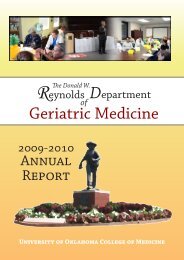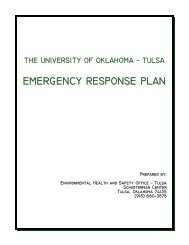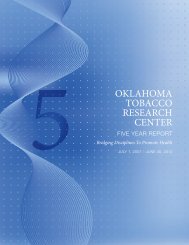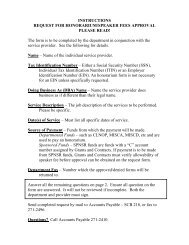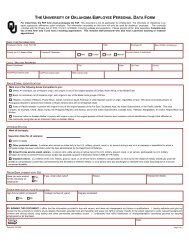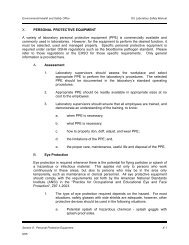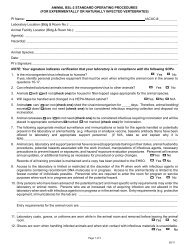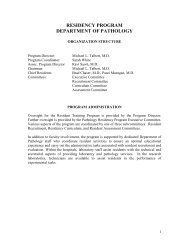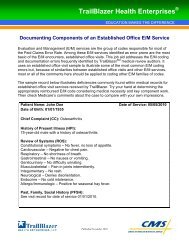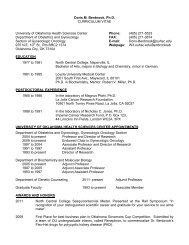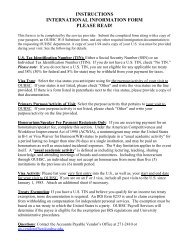The Unofficial Guide to First Year - University of Oklahoma Health ...
The Unofficial Guide to First Year - University of Oklahoma Health ...
The Unofficial Guide to First Year - University of Oklahoma Health ...
Create successful ePaper yourself
Turn your PDF publications into a flip-book with our unique Google optimized e-Paper software.
UNOFFICIAL GUIDE<br />
• Dr. Prodan presents material on Myasthenia Gravis and is a good lecturer<br />
in my opinion (not <strong>to</strong> mention he has a sweet accent because he is from<br />
Transylvania!).<br />
o Know that Myasthenia is a disease <strong>of</strong> fluctuating weakness, know<br />
it is a post-synaptic disorder, know it responds best <strong>to</strong> ACh<br />
esterase inhibi<strong>to</strong>rs, know the main age groups afflicted, and know<br />
the differences and causes <strong>of</strong> small and large fiber neuropathies.<br />
• Last year’s class didn’t have the spinal cord correlation with Dr. Shel<strong>to</strong>n<br />
because he had an emergency during our lecture period, and as far as I<br />
recall, we didn’t have him either, but he may pop up for you guys. From<br />
former students though, we’ve heard that he is a good lecturer but a very<br />
fast talker!<br />
• Dr. Herman Jones is a stud…there is no other way <strong>to</strong> explain it. <strong>The</strong> guy<br />
puts things in<strong>to</strong> terms that are easy <strong>to</strong> understand and remember and<br />
shows some <strong>of</strong> the best videos <strong>of</strong> the semester, not <strong>to</strong> mention he is<br />
hilarious. He mainly talks about frontal lobe lesions and seizures, and<br />
the many physical and neurological signs that follow.<br />
o Know how seizure or lesions <strong>of</strong> BA 8 will affect the eyes, know<br />
the main problem with lesions <strong>of</strong> the three behavioral circuits <strong>of</strong><br />
the frontal lobe (i.e. dorsolateral = dysexecutive), and know the<br />
deficits and signs associated with frontal lobe problems (he gives<br />
very good mnemonics <strong>to</strong> use!)<br />
• Dr. Gordon is the Chairmen <strong>of</strong> the Neurology Department, so this man<br />
knows his neuro who taught us specifically about strokes. He is an<br />
incredibly enthusiastic lecturer, and although he has the tendency <strong>to</strong><br />
condescend and “shhhhh!” the class, Dr. Gordon is a very bright man<br />
and you can learn a lot from him. He is also very approachable one-onone,<br />
and it is obvious teaching is a passion for him, even if he seems <strong>to</strong><br />
believe that first year medical students are all a bit dim. Much <strong>of</strong> his<br />
information has already taught by Dr. Blair, but the final exam will be<br />
over-loaded with lesion questions (strokes being the most likely cause <strong>of</strong> a<br />
lesion), so his lectures are a great review for the final.<br />
• Dr. Blair sometimes writes the questions for these lecturers so if he is<br />
there and starts scribbling frantically during a certain section – quit the<br />
daydreaming and LISTEN!<br />
• To go or not <strong>to</strong> go? I would suggest going, as these guys are all very<br />
experienced clinicians in their respective fields and all do a great job<br />
relaying their information <strong>to</strong> students. If you don’t feel like you have the<br />
time, the note groups and syllabus are ample, but these are seriously<br />
some <strong>of</strong> the more interesting lectures <strong>of</strong> the year.<br />
A LITTLE BIT OF CONSOLATION<br />
94




